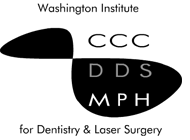|
||||
Childrens Oral Health
 Toddler Tooth Tips
Toddler Tooth Tips
Toddler Tooth Tips
Congratulations! Like most children between 3 and 6 months, your infant just received his or her first tooth. But as a parent, do you know how to take care of those teeth to ensure a healthy smile that will last a lifetime? Take your child to the dentist six months after the eruption of the first tooth, encourages the Academy of General Dentistry (AGD), an organization of general dentists dedicated to continuing dental education.
"At the first visit the dentist will show you the right way to care for your child's teeth by showing you brushing techniques and identifying any early problems, including crowding, appearance of calcium deposits or an abnormality in the number of teeth," says AGD spokesperson Julie Barna, DDS, MAGD.
Use a warm washcloth or a moistened cotton swab to clean your child's teeth after every meal. This gets the child used to something in his or her mouth. After this, graduate to a small, soft toothbrush. You don't need to add toothpaste into the regimen until your child is 2 years old; use only a pea-sized amount on the bristles. "Make sure to develop a system so that you don't miss any teeth," says Dr. Barna. She suggests starting from the back to clean the molars, which are most susceptible to infection, and then working forward to the front teeth by pulling back the lips. You can either face the child or have him or her sit on your lap.
Additional oral health tips for parents:
• Bedtime is the most important time to brush.
• Schedule dental appointments early in the day, but avoid naptime. When bringing the child to the dentist for the first time, it's okay to bring a comfort item such as a blanket or favorite toy. Make the experience positive for the child and try not to instill your own fears into the child.
• Change your child's toothbrush every two months and after the child has been sick. Dr. Barna says parents should go through approximately four brushes between every six-month checkup.
• If your child is sick, toothpaste should be placed on the brush via a cotton swab or a clean finger to avoid contaminating the toothpaste tube.
• Many children like to chew on the bristles. Chewing on the bristles bends them, making it difficult for the toothbrush to clean away plaque. If this is the case, have one toothbrush the child can play with and one that you use to clean the teeth.
• Pacifiers can be used until the child is 1 year old. Most pacifiers lie in a position that will not cause any harm to a child's mouth.
Prolonged usage, however, can cause increased ear infections from sucking or an open bite.
• If your child falls and cuts his or her lip, use something cold, such as a Popsicle. Your child will be excited about a treat, and it will reduce swelling at the same time. If the swelling is severe or the bleeding continues, see your dentist right away.
• If necessary, only let your child go to sleep with a bottle filled with water. Formula, milk or juice can cause baby bottle tooth decay.
• Avoid chewable vitamins that list sugar as the first ingredient.

Original content of this reprinted with permission of the Academy of General Dentistry. © Copyright 2007-2009 by the Academy of General Dentistry. All rights reserved. Read the original article here.







